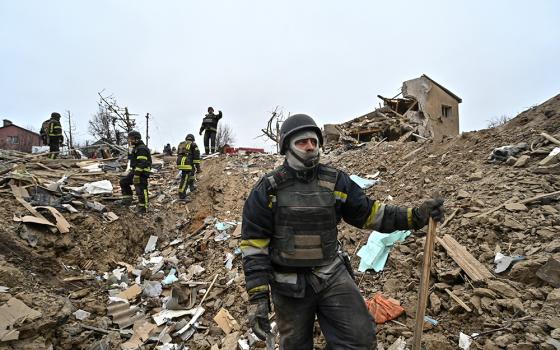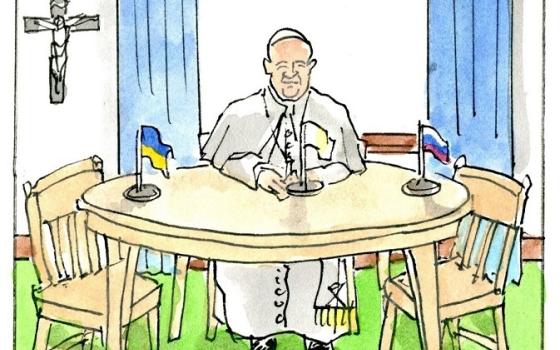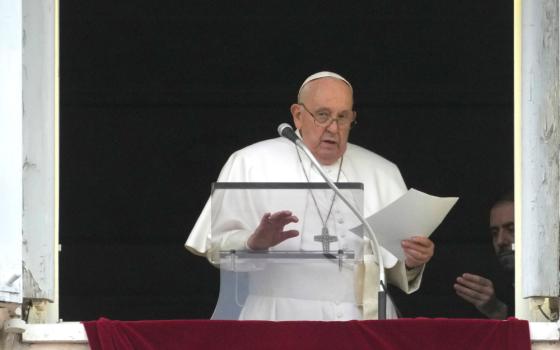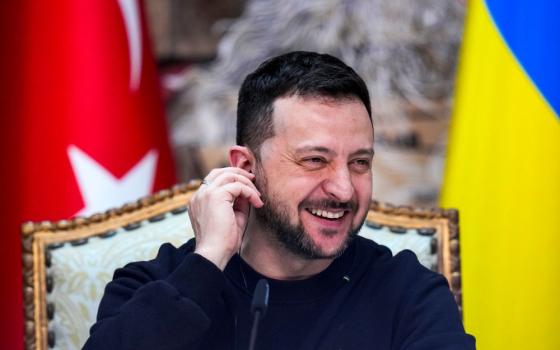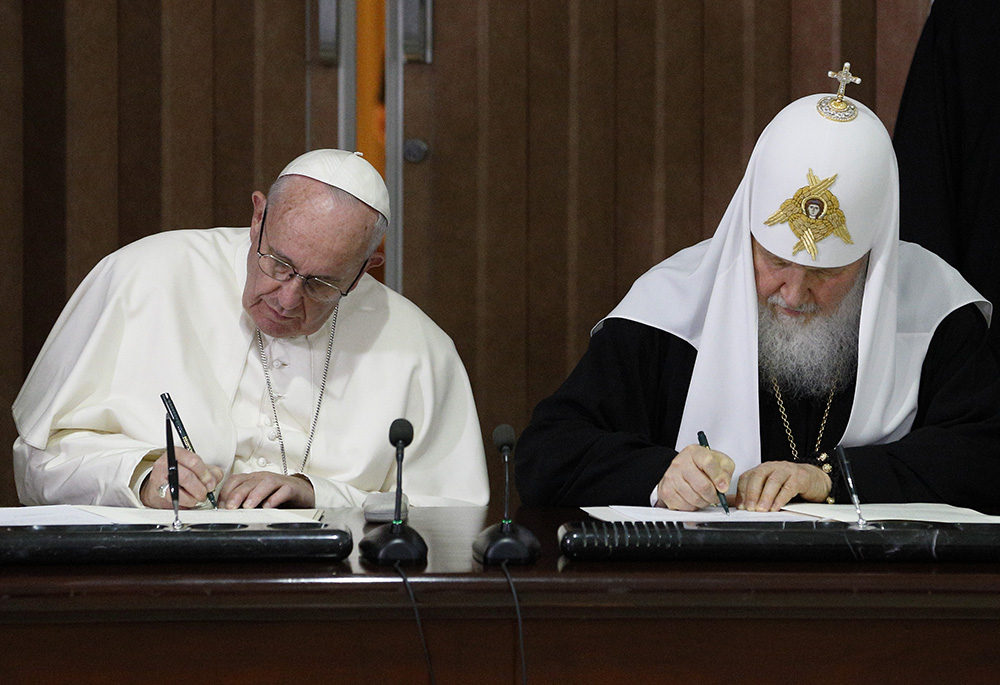
Pope Francis and Russian Orthodox Patriarch Kirill of Moscow sign a joint declaration during a meeting at Jose Marti International Airport Feb. 12, 2016, in Havana. (CNS/Paul Haring)
The conflict in Ukraine and its potential to cause serious escalation between Russia and the United States gives new purpose to the season of Lent and its call to prayer and fasting.
Does history offer any precedent for hope that this confrontation can be resolved? What does hope look like now that the shooting has begun? Between Ash Wednesday and Easter, who among our spiritual leaders can restore trust and guide the adversaries toward peace?
In 1962, when the Cuban missile crisis held the world hostage at the precipice of nuclear war, few people knew that quiet diplomacy by Pope John XXIII helped provide the United States and the Soviet Union the high ground they both needed to stand down. Nikita Khrushchev seized the title of global peacekeeper the pope was pleading for by withdrawing Soviet weapons from Cuba, while John F. Kennedy courageously conceded what the Soviets demanded by quietly removing U.S. weapons from Turkey.
In August 1963, two months after the pope's death from stomach cancer and three months before Kennedy's assassination in Dallas, the first Nuclear Test Ban Treaty was signed. Pope John's 1962 peace proclamation, followed by his encyclical Pacem in Terris, articulated the link between justice and peace and laid the groundwork for total nuclear disarmament as imperative for any progress toward world order.
But it was his personal influence with Kennedy and Khrushchev that made John a trusted broker. This was captured by NCR's then-Vatican correspondent Peter Hebblethwaite in his 1985 biography, Pope John XXIII, Shepherd of the Modern World. Hebblethwaite recounts the March 1963 visit between John and Alexei Adzhubei, Khrushchev's son-in-law, and his wife, Rada Khrushcheva.
Their exchange was warmed by the pope's focus on their children and his memories of Bulgaria, where he had served as apostolic visitor for 10 years early in his career. Adzhubei noted the similarity between the pope's large peasant hands and those of his father-in-law, hands "hardened by toil." Despite the political and spiritual gulf separating the Vatican and the Soviet Union at the time, mutual trust and even affection had bridged a political crisis. These hands had symbolically clasped across enormous differences.
Advertisement
Sixty years later, the Russian invasion of Ukraine again casts a baleful shadow over the world and, as death and destruction mount, hope of a negotiated settlement is rapidly dimming. But are there historical parallels that still offer hope? Diplomatic language is limited when defining a political conflict that is also spiritual in nature. When one side must lose for the other to win, different language is needed to reframe the issues to offer a way forward.
Part of this conflict's unpredictability is expressed in the statement, "No one knows what is in Vladimir Putin's head." A better question is, "Does anyone know what is in his heart?" His long revisionist history of the collapse of the Soviet Union and the humiliation of Mother Russia offer some clues. But there are other glimpses as well.
Putin was born in 1952 and grew up in a working-class neighborhood in St. Petersburg. His path to power began as a KGB agent. He was in East Germany at the time of the 1991 collapse of the Soviet Union. He was forced to drive a cab to survive, but forged his future within the corrupt autocracy that replaced communist control. Obsessed with restoring Russian honor, he emerged as an uncontested strongman determined to avenge the West's expansion into Russia's historical sphere of influence.
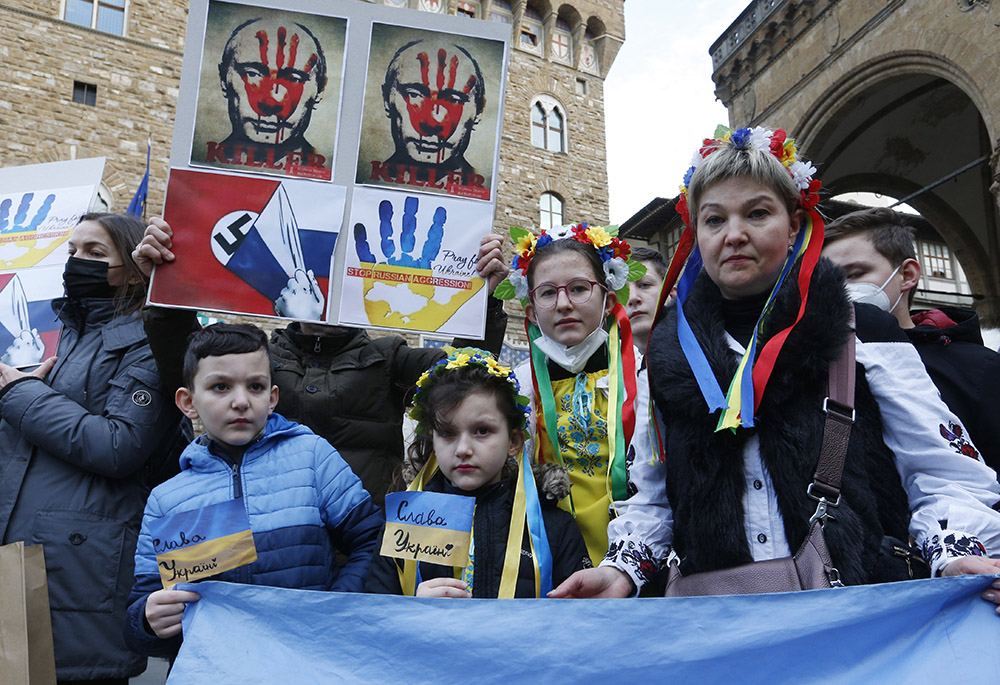
Ukrainians living in Italy protest against the war in Ukraine in Piazza della Signoria Feb. 27 in Florence, Italy. (CNS/Paul Haring)
Putin is also a baptized and practicing member of the Russian Orthodox Church and supports Patriarch Kirill's view that a strong national church is part of the cultural and spiritual unity of Russia. Putin has applied this to his belief that Ukraine is inseparable from Russia.
Reportedly, one of Putin's favorite films was "The Island," a 2006 fictional drama about a young Russian during World War II captured by the Nazis on a coal barge and forced to shoot his captain to save his own life. He escapes and is rescued by monks who accept him into their monastery on an island. Overcome with guilt, he commits to a life of penance.
The film ends with the man's surprise redemption and death. The influence of this film on Putin's heroic self-image is unknown, but as he turns 70, it may conceivably shed light on his obsession to redeem himself by making Russia great again. With this mindset in place, he is not likely to bow to Western sanctions.
Could Francis and Kirill now initiate a conversation focused on their shared spiritual values? Is there ground for one more inspired handclasp between men of faith to restore peace?
Facing him on the world stage right now is another working-class figure named Joe Biden, whose ambitious path to power has also been shaped by tragedy, patriotism and his faith (as a Catholic). He also finds his legacy in defending democracy against tyranny as America's gift to history. Biden versus Putin portends the nonnegotiable collision course we are now witnessing. Unless something truly extraordinary takes place.
Nothing ventured, nothing gained is a truism, but Pope John was seen by Vatican hardliners as hopelessly naive for his detente with the Soviet Union. Fortunately, because of John's success in 1962, we are still here as the world faces another path to nuclear brinkmanship as dangerous and unpredictable as it was 60 years ago.
The question now is whether another conversation is still possible that can elevate this conflict to an awareness of the spiritual values involved.
In 2016, Pope Francis became the first Catholic pontiff to meet a Russian patriarch, traveling to Cuba to meet the person he called his "brother."
Could Francis and Kirill now initiate a conversation focused on their shared spiritual values? Is there ground for one more inspired handclasp between men of faith to restore peace? If they succeed by reaching into the heart of this standoff, it could bring us back from the brink and deliver the second greatest miracle in modern history.




